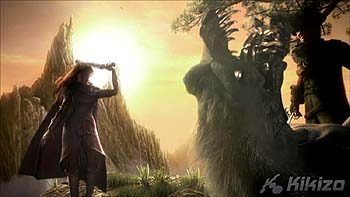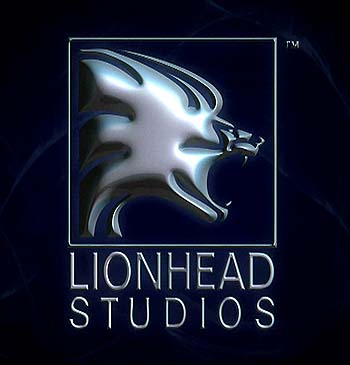Peter Molyneux Interview June 2006
Possibly the best interviewee in the games industry talks to Kikizo once more to get all loose-lipped about Fable 2 and being part of Microsoft's gaming empire. Plus: Is Project 'Dimitri' actually... Fable 2?!
Page 3
Kikizo: What do you think are the advantages and disadvantages to each approach?
Molyneux: OK, well, the advantages... there's two ways to answer that question, one in developer terms, and one in gamer terms. In developer terms, the narrow path is fantastic. You know where the player is after two hours, three hours, four hours... what the player's got, how powerful the player is... it's just so easy to balance. That is just a joy, because, you know, you can say six hours, fifteen minutes in, players, if they've got to this point, they've got the Sword of Darbur and they're at level 20, and it's just much easier to design.
The sort of more free-flowing approach means - we had this in Fable 1 - is we had some people who could get to a point in two hours, and some who could get to a point in 20 hours. Some people could just be learning how to use combat for the first time, really, and others could be the most experienced swordfighter. And that makes balancing MUCH more difficult. It means you've got to have a world that is a little more reactive, have stories, and the characters in those stories change a little bit... and that's exactly what they did in Fable, maybe you didn't notice that, but there was this little, slight sense of auto-balancing that was going on as you were playing it, that was trying to get you through the game - but get you CHALLENGED through the game. So that - in developer terms - is a lot harder.
In gamer terms, I think... the advantages of a strong storyline is that you know where you are. Personally, the disadvantage to complete open-endedness is that you DON'T know where you are. Personally, recently, especially with some games I've found, if you give people total freedom, it is absolutely terrifying. And I just want to, I think, "God, this is just too much." I've seen some games that say "You can see and visit EVERY PLANET IN THE GALAXY!" And I'm thinking, "My God, I am going to be here for TWO HUNDRED YEARS visiting every one. And there's just too much, too much in my poor little mind to handle. I want to know, what it is that I can change, and what it is that I have freedom to do. And that's the advantages and disadvantages there. Freedom is... freedom can actually be boring, you've got to realize that - stories and direction can be constricting. And the golden path for me is something that gives you a little bit of choice, but not too much.
Kikizo: Can we expect projects like BC coming back, or...?
Molyneux: Uh, we're definitely not saying what the second title is... and um, you know, no hints allowed. But I thought BC was a fantastic world, I loved the idea of being in this savage, brutal environment, and, um, who knows? It's on the shelf, and it's not being ripped up and thrown away, and I definitely can't say more than that.
Kikizo: Can we ever expect you to do something like a first-person shooter?
Molyneux: You know, I have... I would love to think that I would at some time in my future, and - fortunately for all you guys, here's the sad thing, is you're going to see me, coming in here on my Zimmer frame, my colostomy bag hanging down, saying, "I've got a REALLY GOOD IDEA!" So, you have years of this left, and I'm going to see you grow old. And I hope that, in one time in the future, that I'd be brave enough to attempt some new genres. And a first-person shooter is definitely interesting.
I definitely - this is for me personally - I think of what you may think of as genres, and you can see out on the show floor now, what we think of as genres is changing rapidly. And, um, you know, for me, what's so much more important nowadays is not the genre but the emotion behind the genre - and this is what we're saying in Fable at the moment - what I'm saying as the designer of Fable is, "Okay, this is a sequel. How do we want people to feel? How do we want people - what emotion do we really want people to feel?"
And that, to me, is far more important than the genre I work with. To make you feel happy, to make you feel care, to make you feel sad, to make you feel engaged - to make you feel as if this is as important as anything else in your life. Those are the things I want to get to, and that's far more than the genre I do. Saying that, I'd LOVE to do a sports game. I'd REALLY LOVE to do a sports game, because I think those...
Kikizo: What sport?
Molyneux: I'd love to do football. I'd love to do a football game. I don't think they've changed one iota. I think there was some interesting stuff at the start of football games... you had things like Sensible Soccer, and you had... what was the name, Kick-Off? You had lots of different mechanisms, and it's kind of all just come into we know exactly what the controls are going to do, and I'd love to say "Right. Let's get back to what football's all about." And what is it REALLY all about? What do you want, as a player, to be when you play football, and what do you want to feel when you play? I'd love to do that, it would be a real joy. That's not saying I'm going to do a football game, I'm just saying a personal thing is that, you know, the challenge of doing that would be fantastic.
Kikizo: What current games do you admire?
Molyneux: You look around, and there's lots of different games, lots of different things to admire. Sometimes it's the pure visual beauty of what you see, other times it's the clever mechanics that you play around with, sometimes it's just the off-the-wall ideas that sneak into the games, but now... I'm always constantly surprised by what I see, and to give you an example that I think is a great example of innovation in games, is Fight Night, from Electronic Arts. They threw away all of the interface, they just had two boxers in the ring, they were fighting away, and it wasn't about, you know, "if you hit this person six times", it was about how the pace changed, and I think that's hugely admirable. Obviously I love... mechanics, and I love, you know, smart little things in gameplay...
Kikizo: Have you played Oblivion?
Molyneux: I have played Oblivion, I loved Oblivion. It was - personally, I thought - a little bit scary, when you came out of the prison and there was this big world there... the trouble with me and Oblivion, I am completist, so... you know, if you say to me, "You can pick up those flowers," or "You can pick up those things," then I'll pick them all up. But, uh, I thought it was an amazing technical feat.
![]()
Kikizo Staff
Go here for more interviews
| Video Coverage (Latest Videos & Video FAQ) | |||
| PLEASE DO NOT DIRECT LINK TO ANY MEDIA FILE ON KIKIZO | |||
| Description | Dur. | Size | Details |
| Previous Videos | |||
|
Fable 2 Direct feed trailer (X360 - Microsoft) |
01:15 | 41MB | DF, ED, 16:9 852x480p60 5.2Mbps |
|
The Movies: Stunts & Effects Direct feed trailer (PC - Activision) |
01:27 | 18MB | DF, SD, 16:9 640x360p30 2.3Mbps |







 Satoru Iwata Video Interview - the late Nintendo president spoke with Kikizo in 2004 as 'Nintendo Revolution' loomed.
Satoru Iwata Video Interview - the late Nintendo president spoke with Kikizo in 2004 as 'Nintendo Revolution' loomed. Kaz Hirai Video Interview - the first of Kikizo's interviews with the man who went on to become global head of Sony.
Kaz Hirai Video Interview - the first of Kikizo's interviews with the man who went on to become global head of Sony. Ed Fries Video Interview - one of Xbox's founders discusses an epic journey from Excel to Xbox.
Ed Fries Video Interview - one of Xbox's founders discusses an epic journey from Excel to Xbox. Yu Suzuki, the Kikizo Interview - we spend time with one of gaming's most revered creators.
Yu Suzuki, the Kikizo Interview - we spend time with one of gaming's most revered creators. Tetris - The Making of an Icon: Alexey Pajitnov and Henk Rogers reveal the fascinating story behind Tetris
Tetris - The Making of an Icon: Alexey Pajitnov and Henk Rogers reveal the fascinating story behind Tetris Rare founders, Chris and Tim Stamper - their only interview? Genuinely 'rare' sit down with founders of the legendary studio.
Rare founders, Chris and Tim Stamper - their only interview? Genuinely 'rare' sit down with founders of the legendary studio. The History of First-Person Shooters - a retrospective, from Maze War to Modern Warfare
The History of First-Person Shooters - a retrospective, from Maze War to Modern Warfare